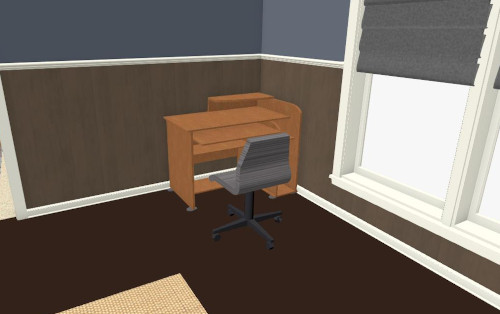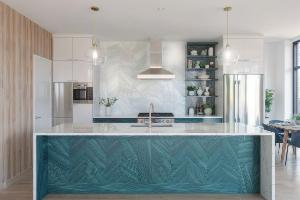Even before the pandemic, the trend of people working from home has been rising steadily over the years. The global event of 2021 has only accelerated this shift away from working in the conventional office.
As more and more people slowly come to terms with the idea that remotely working from home is not just a short term arrangement, more creative thought are being put into setting up the working space at home.
Since you have full control over how you design your home, why not make the most of it and incorporate some feng shui to boost your resourcefulness.
While feng shui is most popularly associated with residences, it’s no surprise to find business owners practice it in the design and decorations in the office.
The “home office” is literally somewhere in between the home and office. Here’s how to use feng shui to setup the home office space.
1) Select location
Most people would probably already a default space in mind for the home working area. This is mostly due to space limitations.
If you already have study room where you work, why move to another place? Right?
So this step is mostly geared towards those who still have a choice regarding where to set up the work desk and all the accessories that come with the working space.
Since we all work for money, it is more than appropriate to say that this is strongly linked to the life aspect of wealth generation. For this reason, the home office would be suitably located in a wealth location.
While there are various methods that can be used to identify different wealth areas within a dwelling, one of the most straight forward techniques is to use the 8 mansions formula.
To put this feng shui concept into practice, use a compass to identify which direction your house is facing. Once you retrieve that nugget of information, the opposite of the facing direction would be the sitting direction. With the sitting direction of the house now revealed, the house can now be grouped into one of 8 categories.
The table below indicates the wealth sector based on the sitting of the house in 8 mansions feng shui.
| Sitting | Wealth Sector |
| N | SE |
| S | E |
| E | S |
| W | NW |
| NE | SW |
| NW | W |
| SE | N |
| SW | NE |
It’s worth noting that this particular wealth sector is more commonly known as the Sheng Chi (SC) sector. Because it is most linked to wealth aspects of life, it is also commonly termed as a wealth area as well.
For example, if your house sits at West, then a wealth location sits at the Northwest sector of the house. This would generally be a good area to set up your home office. It ensures that you are tapping on that wealth-generating energy and mindset you need to excel at what you do.
If the SC sector is an unsuitable area of the house (like a toilet) to set up a working space, then another simple way to select a good working space is by locating where the annual wealth star is according to flying stars feng shui. This is especially appropriate if your home office is just a temporary stop-gap until the actual office is open again.
Be mindful that we are talking about the wealth star instead of a wealth location here. And this wealth star is a reference to the white star 8, which is the most prosperous star in this period.
The below table shows where the wealth star is located in the coming years.
| 2020 | 2021 | 2022 | 2023 |
| NW | W | NE | S |
So looking at the table above, it can be observed that the wealth star flies into the west in 2021. So this would be another suitable location to set up the home office in the year.
2) Desk orientation
Some people might insist that the position of their workstation cannot be changed. However, it can almost always be adjusted to another orientation.
It’s just a matter of how badly you want to implement good feng shui to the work space at home.
If you are able to dedicate a whole room for the home office, which is common for a home business, then it is really up to you over how the room should be configured.
The work desk is the primary furniture that plays the most critical role in this exercise. The placement of it directly and indirectly governs what you face, what is behind you, how exposed you are when working, what is on your left and right, etc.
So the focal point here is the placement and orientation of the desk itself.
While the subject of desk placement has already been written about previously, feng shui beginners should pay attention to 3 main rules.
Firstly, what is behind you can influence how likely you would be sabotaged by competitors, betrayed by colleagues, or be blindsided by events you never saw coming. There should not be a huge empty space behind where you sit. And a definite no-no is having the door or entrance behind you.
Secondly, what is in front of you is a reflection of where your endeavors lead you. If you face an empty wall, then get ready to constantly run into obstacles keeping you from attaining your pursuits. While rookies in fengshui might lack the expertise to interpret what is in front of them, the safe thing to do is to have a living space in front. If your options are limited, at least have the space in front larger than the space behind.

A desk facing the wall brings a bleak outlook
Thirdly, remember not to expose yourself to poison arrows when at a seated position. Some of the common sources of sha chi from home interiors are exposed pillars, beams hanging above, facing a staircase, being confronted by the entry line of the door, etc. It’s also worth noting that when seated, and there is a view to the other areas of the house via the open door, one should not see the toilet, stove, bed in bedrooms, and especially the main door into the house.

Work desk facing wall, with seat in the door’s entry line, and with the space behind seat considerably more spacious than in front
Remember. Desk placement is the one most important factors of a home office with good feng shui.
And whenever possible, implement the concepts of the command position.
While not absolutely necessary, incorporating your personal SC direction into the concepts already listed above can supercharge your productivity. Only do this if there is still flexibility in your desk placement options after implementing the previously mentioned fengshui concepts. This is because even if you face your SC direction, you will still not be able draw on it’s power if your desk is afflicted.
You can identify your personal SC direction by determining your personal kua number. This can be easily done by looking at the kua number table for reference.
Once you have your personal kua number, your personal SC direction can be determined in the below table.
| Kua | Sheng Chi |
| 1 | SE |
| 2 | NE |
| 3 | S |
| 4 | N |
| 6 | W |
| 7 | NW |
| 8 | SW |
| 9 | E |
So if you are facing your SC direction when seated at your work desk, you would be able to tap on your personal SC energy.
Be mindful that personal SC is best practiced by facing a specific direction. Not by being in a directional space.
3) Around the desk
While decorations and what’s around the desk are not the meat of home office feng shui, they are like the appetizers and garnish that make a meal extraordinary.
One of the most important elements of managing this space surrounding the desk is the removal of clutter. I cannot stress enough of how important this is.
For some reason, many people play down the importance of a clutter-free environment in feng shui. But when there is clutter, energy gets distorted like how a stream of clear water can become murky when the base is disturbed.
Do you want the activities you conduct for your home business to be drawing on muddy water or clear spring water?
Despite how tedious it can sound like, decluttering can actually be a very simple systematic process as long as you have a plan in hand.
Another thing that needs to be addressed is the location of windows.
Many people feel empowered by having large windows directly in front or behind them. When it is in front of you, you are confronting powerful forces head-on. And when it is behind you, you are being vulnerably exposed to these forces.

Windows behind workstation invites bad luck with adversity
The exception for windows behind is when there is a mountain in view. That is favorable as the mountain acts as support to your pursuits and challenges.
Which is also why business people love to hang paintings of mountains and landscapes behind their work chair.
The best location for windows are actually on the side with regards to the seating position.
There’s also a rising trend of including plants (both big and small) into living spaces to bring that touch of nature and tranquility into the house.
Plants, especially tall ones, are very useful to remedy poison arrows in the space in question.
For example, if a particular spot is determined to be perfect for a feng shui desk position… except that it leaves the seat exposed to a wall’s edge, then placing a tall potted plant such as the iron tree can effectively resolve the affliction by removing it’s form. Thus freeing up that desirable spot from affliction.
The placement of plants in feng shui is one of the most useful hacks. But tend to receive the least credit.
Just don’t go wild and create a jungle atmosphere. Otherwise, your white tiger might run rampage in the greenery.
And if you want to put small plants on display on the work desk, stick to a small-sized one and keep the number at 1.
Finally, remember that if you are unable apply most of the feng shui concepts for the home office, then the single most important thing to focus on is desk placement.
When your get this right, almost everything else would automatically fall into place.















